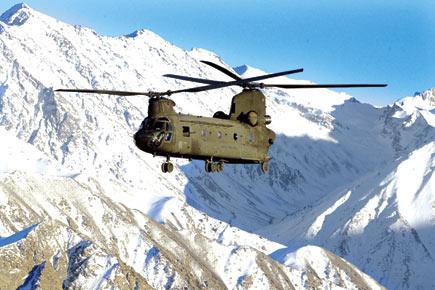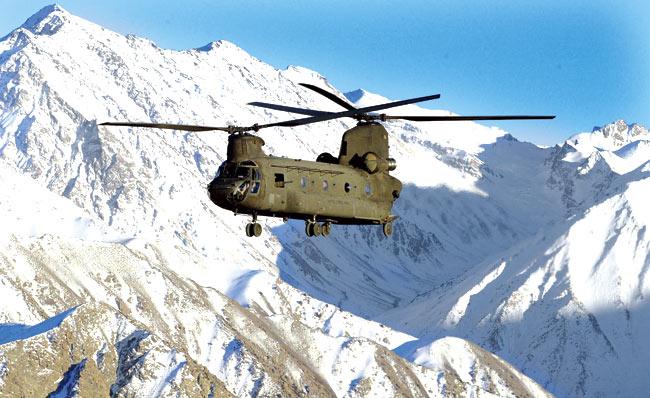The ‘mountains of death’ that have passes between high peaks that even the troops of Alexander the Great found treacherous are once again the scene of battle

 The ‘mountains of death’ that have passes between high peaks that even the troops of Alexander the Great found treacherous are once again the scene of battle. The 800km of Hindu Kush mountains stretch from Central Afghanistan to Northern Pakistan.
The ‘mountains of death’ that have passes between high peaks that even the troops of Alexander the Great found treacherous are once again the scene of battle. The 800km of Hindu Kush mountains stretch from Central Afghanistan to Northern Pakistan.
ADVERTISEMENT
It has been the cradle of militant movements for decades and now is being targeted simultaneously by the Pakistan army and American drones. The Taliban are on the run. The question is where? and for how long?

The 800 km stretch of the Hindu Kush mountain range from Central Afghanistan to Northern Pakistan has been the cradle of militant movements for decades and now is being targeted simultaneously by the Pakistan army and American drones. Pic/Getty Images
Militants owing allegiance to Al Qaeda, the sundry networks of the Taliban, freelance and tourist jehadis whether Uzbeks, Chechens, Kurds, Somalians or British, French, Chinese besides Afghan and Pakistanis have been trained and indoctrinated for global jehad from here.
Operation Zarb-e-Azab launched by the Pakistan Army to target militants in this region after the doomed peace talks with the Taliban failed has resulted in several militants being killed. Not much is known about the identity of the militants other than the sanitised press releases from the Pakistan Army’s PR department.
About 450,000 people from this region have been internally displaced. The good militants (read those who do the Pakistani establishment’s bidding) such as the dreaded Haqqani network of terrorists were tipped off by friends in the Pakistani establishment and have fled to safe havens.
According to the ‘Jang’, a Pakistani paper, some of them have also fled to AJK (Azad Jammu Kashmir is how Pakistan refers to Pakistan Occupied Kashmir). Militants have threatened to attack important installations here.
According to Pakistani Urdu newspaper ‘Jasarat’, intelligence agencies have warned the Pakistani government that groups belonging to the Asmatullah Muawiya and Tariq Ghanda in Punjab could carry out terror attacks on national institutions or important places in cities of Rawalpindi, Lahore, Faisalabad, Multan and Gujarat.
These cities are in Pakistani Punjab, which is home to Prime Minister Nawaz Sharif. The attacks executed in similar fashion as the Karachi airport attack is planned to be retribution for the North Waziristan operation by the Pakistan Army.
There are thousands of tourist jehadis on the prowl all across Pakistan now and dangerously close to Indian borders, from Punjab to Rajasthan to Kashmir. They are armed, crazed and have no desire to live, just attain ‘martyrdom’ and ‘fame’ by causing maximum damage to innocents. If these foreign jehadis cross over into India, it is unlikely they will find empathy or help other than from some jehadi groups in Kashmir.
They have little in common, even ideologically, with virulent groups in Kerala, West Bengal or Uttar Pradesh. even in a scenario where fleeing militants from Pakistan sneak into Kashmir, they will find little in common with the youth in the valley who aspire for better jobs and political rights, not some random Islamic ‘cause’.
But that does not mean that India can be blase about the potential threat. It is imperative that the central and state government make borders and cities less vulnerable, improve intelligence gathering and engage Kashmiri in a dialogue for a better future.
The present condition of calm in Kashmir can suddenly turn turtle anytime. With assembly elections a few months away, political parties will not hesitate in fanning flames of passion. Any rally, any demonstration, any grouse or anger anyhow turns into a demand for ‘azadi’ in minutes.
While the rest of the country assumes that Kashmir is pampered, a second generation of Kashmiris is living under the constant presence of the army, with a democratic process that has not fully embraced them and a prosperity that has arrived in the rest of India but has been slow and sporadic in Kashmir.
Greater number of Kashmiri youth are clearing the Indian civil services exam every year; more Kashmiris are getting jobs in Delhi, Bangalore, Mumbai and Chennai. But more jobs in Kashmir itself will work better. The new jehadi wave sweeping across nations, from Iraq to Pakistan, will then have no chance of entering Kashmir.
The fleeing and asylum-seeking jehadis are well aware that at the end of the 13-year stay in Afghanistan, the American troops are heading home with neither the will nor the authority to stay on. The drawdown date had been announced years ago by the American President and the US is likely to stick to the timetable.
The Iraq situation today is proof enough that an ill-timed and ill-advised pull out can have disastrous consequences. The military operations in the Hindu Kush, in the light of the US pull-out from Afghanistan, have to be watched carefully in Delhi.
Smita Prakash is editor, News at Asian News International. You can follow her on twitter @smitaprakash
 Subscribe today by clicking the link and stay updated with the latest news!" Click here!
Subscribe today by clicking the link and stay updated with the latest news!" Click here!






